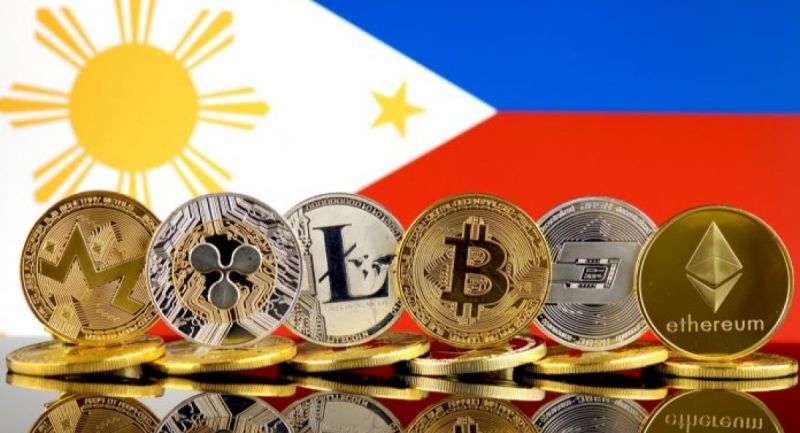Crypto Exchange Market Boosted By Central Bank In Philippines

Crypto exchange markets are expanding in numbers and size all over the world. The Philippines is no exception and the country has seen the number of licensed exchanges and other crypto stakeholders in the country increase significantly.
The Philippines, through its central bank the Bangko Sentral ng Pilipinas (BPS), has licensed 11 more crypto exchanges in its country to bring the number of crypto stakeholders operating in the country to 48. The exchanges are registered with the central bank as remittance and transfer companies. People in the Philippines are able to receive remittances in cryptocurrency through these exchanges. The other 37 crypto exchange companies are licensed under the Cagayan Economic Zone Authority (CEZA). CEZA is a state enterprise that is set to manage the development of the Cagayan Special Economic Zone And Freeport.
The newly licensed exchanges under the BPS are Coinville Phils Inc., Etranss Remittance International Corp., Betur Inc. dba Coins.ph, Virtual Currency Philippines Inc., Fyntegrate Inc., Bexpress Inc., Aba Global Philippines Inc., Britain Moneytech Co. Ltd., Bloomsolutions Inc., Zybi Tech Inc., and Rebittance Inc. These exchanges are registered under Circular No. 944 which was issued on the 7th of February 2017. Registration of these entities is done to place safeguards and mitigate the risks that come with virtual currencies such as money laundering and terrorist financing accruing to the central bank. The move to license these exchanges with the BPS will be key in creating a safe and regulated environment for cryptocurrency trading in the Philippines.
Continual expansion in the number of crypto exchanges in the Philippines is reflective of the general growth of the cryptocurrency industry worldwide. Cryptocurrencies are fast making their way into the mainstream and the establishment and legal licensing of markets and exchanges in the Philippines will make this adoption into the mainstream easier. The governor of the BPS stated that the central bank recognizes cryptocurrencies as a medium of exchange and that they have made a regulatory approach to allow innovation in the financial market and for the financial industry to take full advantage of the benefits that come with cryptocurrencies.
Crypto traders are encouraged to keep an eye out for illegal exchanges and markets. There has been a few unregistered and unlicensed entities that were trading in the Philippines before their discovery. Some of the companies that falsely claimed to be licensed include Grace Exchange, Freedom Traders Club, Hedger Technology, Teo Consulting Group and Ploutos Coin. Engaging in business with unregistered exchanges puts a trader at risk of losing their money and investment to fraud. It is also illegal in the Philippines and the BPS encourages citizens of the Philippines to engage in crypto related business with entities registered with the BPS or CEZA.
The crypto market in the Philippines is growing and the central bank is positioning itself to allow the mainstream adoption of cryptocurrencies. The registration of some of the best digital crypto exchanges in the Philippines will go a long way in facilitating the adoption of virtual currencies in the country.
https://insidebitcoins.com/news/crypto-exchange-market-boosted-by-central-bank-in-philippines/231000
Related Links:
INVESTMENT OPPORTUNITIES
VISITOR COUNTER
 0ki.group/wp-content/plugins/xt-visitor-counter/styles/image/chevy/7.gif' alt='7'>
0ki.group/wp-content/plugins/xt-visitor-counter/styles/image/chevy/7.gif' alt='7'> 0ki.group/wp-content/plugins/xt-visitor-counter/styles/image/chevy/7.gif' alt='7'>.u
0ki.group/wp-content/plugins/xt-visitor-counter/styles/image/chevy/7.gif' alt='7'>.u 0ki.group/wp-content/plugins/xt-visitor-counter/styles/image/chevy/6.gif' alt='6'>41
0ki.group/wp-content/plugins/xt-visitor-counter/styles/image/chevy/6.gif' alt='6'>41 0ki.group/wp-content/plugins/xt-visitor-counter/styles/image/chevy/7.gif' alt='7'>
0ki.group/wp-content/plugins/xt-visitor-counter/styles/image/chevy/7.gif' alt='7'> 0ki.group/wp-content/plugins/xt-visitor-counter/styles/image/chevy/7.gif' alt='7'>.u
0ki.group/wp-content/plugins/xt-visitor-counter/styles/image/chevy/7.gif' alt='7'>.u 0ki.group/wp-content/plugins/xt-visitor-counter/styles/image/chevy/4.gif' alt='4'>
0ki.group/wp-content/plugins/xt-visitor-counter/styles/image/chevy/4.gif' alt='4'> 0ki.group/wp-content/plugins/xt-visitor-counter/styles/image/chevy/7.gif' alt='7'>
0ki.group/wp-content/plugins/xt-visitor-counter/styles/image/chevy/7.gif' alt='7'> 0ki.group/wp-content/plugins/xt-visitor-counter/styles/image/chevy/7.gif' alt='7'>.u
0ki.group/wp-content/plugins/xt-visitor-counter/styles/image/chevy/7.gif' alt='7'>.u 0ki.group/wp-content/plugins/xt-visitor-counter/styles/image/chevy/6.gif' alt='6'>
0ki.group/wp-content/plugins/xt-visitor-counter/styles/image/chevy/6.gif' alt='6'> 0ki.group/wp-content/plugins/xt-visitor-counter/styles/image/chevy/7.gif' alt='7'>
0ki.group/wp-content/plugins/xt-visitor-counter/styles/image/chevy/7.gif' alt='7'> 0ki.group/wp-content/plugins/xt-visitor-counter/styles/image/chevy/7.gif' alt='7'>.u
0ki.group/wp-content/plugins/xt-visitor-counter/styles/image/chevy/7.gif' alt='7'>.u 0ki.group/wp-content/plugins/xt-visitor-counter/styles/image/chevy/6.gif' alt='6'>41
0ki.group/wp-content/plugins/xt-visitor-counter/styles/image/chevy/6.gif' alt='6'>41 0ki.group/wp-content/plugins/xt-visitor-counter/styles/image/chevy/7.gif' alt='7'>
0ki.group/wp-content/plugins/xt-visitor-counter/styles/image/chevy/7.gif' alt='7'> 0ki.group/wp-content/plugins/xt-visitor-counter/styles/image/chevy/7.gif' alt='7'>.u
0ki.group/wp-content/plugins/xt-visitor-counter/styles/image/chevy/7.gif' alt='7'>.u 0ki.group/wp-content/plugins/xt-visitor-counter/styles/image/chevy/4.gif' alt='4'>
0ki.group/wp-content/plugins/xt-visitor-counter/styles/image/chevy/4.gif' alt='4'> 0ki.group/wp-content/plugins/xt-visitor-counter/styles/image/chevy/7.gif' alt='7'>
0ki.group/wp-content/plugins/xt-visitor-counter/styles/image/chevy/7.gif' alt='7'> 0ki.group/wp-content/plugins/xt-visitor-counter/styles/image/chevy/7.gif' alt='7'>.u
0ki.group/wp-content/plugins/xt-visitor-counter/styles/image/chevy/7.gif' alt='7'>.u 0ki.group/wp-content/plugins/xt-visitor-counter/styles/image/chevy/6.gif' alt='6'>
0ki.group/wp-content/plugins/xt-visitor-counter/styles/image/chevy/6.gif' alt='6'> 0ki.group/wp-content/plugins/xt-visitor-counter/styles/image/chevy/7.gif' alt='7'>
0ki.group/wp-content/plugins/xt-visitor-counter/styles/image/chevy/7.gif' alt='7'> 0ki.group/wp-content/plugins/xt-visitor-counter/styles/image/chevy/7.gif' alt='7'>.u
0ki.group/wp-content/plugins/xt-visitor-counter/styles/image/chevy/7.gif' alt='7'>.u 0ki.group/wp-content/plugins/xt-visitor-counter/styles/image/chevy/6.gif' alt='6'>41
0ki.group/wp-content/plugins/xt-visitor-counter/styles/image/chevy/6.gif' alt='6'>41 0ki.group/wp-content/plugins/xt-visitor-counter/styles/image/chevy/7.gif' alt='7'>
0ki.group/wp-content/plugins/xt-visitor-counter/styles/image/chevy/7.gif' alt='7'> 0ki.group/wp-content/plugins/xt-visitor-counter/styles/image/chevy/7.gif' alt='7'>.u
0ki.group/wp-content/plugins/xt-visitor-counter/styles/image/chevy/7.gif' alt='7'>.u 0ki.group/wp-content/plugins/xt-visitor-counter/styles/image/chevy/4.gif' alt='4'>1
0ki.group/wp-content/plugins/xt-visitor-counter/styles/image/chevy/4.gif' alt='4'>1 0ki.group/wp-content/plugins/xt-visitor-counter/styles/image/chevy/7.gif' alt='7'>
0ki.group/wp-content/plugins/xt-visitor-counter/styles/image/chevy/7.gif' alt='7'> 0ki.group/wp-content/plugins/xt-visitor-counter/styles/image/chevy/7.gif' alt='7'>.u
0ki.group/wp-content/plugins/xt-visitor-counter/styles/image/chevy/7.gif' alt='7'>.u 0ki.group/wp-content/plugins/xt-visitor-counter/styles/image/chevy/1.gif' alt='1'>
0ki.group/wp-content/plugins/xt-visitor-counter/styles/image/chevy/1.gif' alt='1'> 0ki.group/wp-content/plugins/xt-visitor-counter/styles/image/chevy/7.gif' alt='7'>
0ki.group/wp-content/plugins/xt-visitor-counter/styles/image/chevy/7.gif' alt='7'> 0ki.group/wp-content/plugins/xt-visitor-counter/styles/image/chevy/7.gif' alt='7'>.u
0ki.group/wp-content/plugins/xt-visitor-counter/styles/image/chevy/7.gif' alt='7'>.u 0ki.group/wp-content/plugins/xt-visitor-counter/styles/image/chevy/0.gif' alt='0'>
0ki.group/wp-content/plugins/xt-visitor-counter/styles/image/chevy/0.gif' alt='0'> 0ki.group/wp-content/plugins/xt-visitor-counter/styles/image/chevy/7.gif' alt='7'>
0ki.group/wp-content/plugins/xt-visitor-counter/styles/image/chevy/7.gif' alt='7'> 0ki.group/wp-content/plugins/xt-visitor-counter/styles/image/chevy/7.gif' alt='7'>.u
0ki.group/wp-content/plugins/xt-visitor-counter/styles/image/chevy/7.gif' alt='7'>.u 0ki.group/wp-content/plugins/xt-visitor-counter/styles/image/chevy/6.gif' alt='6'>
0ki.group/wp-content/plugins/xt-visitor-counter/styles/image/chevy/6.gif' alt='6'> 0ki.group/wp-content/plugins/xt-visitor-counter/styles/image/chevy/7.gif' alt='7'>
0ki.group/wp-content/plugins/xt-visitor-counter/styles/image/chevy/7.gif' alt='7'> 0ki.group/wp-content/plugins/xt-visitor-counter/styles/image/chevy/7.gif' alt='7'>.u
0ki.group/wp-content/plugins/xt-visitor-counter/styles/image/chevy/7.gif' alt='7'>.u 0ki.group/wp-content/plugins/xt-visitor-counter/styles/image/chevy/6.gif' alt='6'>
0ki.group/wp-content/plugins/xt-visitor-counter/styles/image/chevy/6.gif' alt='6'> 0ki.group/wp-content/plugins/xt-visitor-counter/styles/image/chevy/7.gif' alt='7'>
0ki.group/wp-content/plugins/xt-visitor-counter/styles/image/chevy/7.gif' alt='7'> 0ki.group/wp-content/plugins/xt-visitor-counter/styles/image/chevy/7.gif' alt='7'>.u
0ki.group/wp-content/plugins/xt-visitor-counter/styles/image/chevy/7.gif' alt='7'>.u 0ki.group/wp-content/plugins/xt-visitor-counter/styles/image/chevy/6.gif' alt='6'>41
0ki.group/wp-content/plugins/xt-visitor-counter/styles/image/chevy/6.gif' alt='6'>41 0ki.group/wp-content/plugins/xt-visitor-counter/styles/image/chevy/7.gif' alt='7'>
0ki.group/wp-content/plugins/xt-visitor-counter/styles/image/chevy/7.gif' alt='7'> 0ki.group/wp-content/plugins/xt-visitor-counter/styles/image/chevy/7.gif' alt='7'>.u
0ki.group/wp-content/plugins/xt-visitor-counter/styles/image/chevy/7.gif' alt='7'>.u 0ki.group/wp-content/plugins/xt-visitor-counter/styles/image/chevy/4.gif' alt='4'>1
0ki.group/wp-content/plugins/xt-visitor-counter/styles/image/chevy/4.gif' alt='4'>1 0ki.group/wp-content/plugins/xt-visitor-counter/styles/image/chevy/7.gif' alt='7'>
0ki.group/wp-content/plugins/xt-visitor-counter/styles/image/chevy/7.gif' alt='7'> 0ki.group/wp-content/plugins/xt-visitor-counter/styles/image/chevy/7.gif' alt='7'>.u
0ki.group/wp-content/plugins/xt-visitor-counter/styles/image/chevy/7.gif' alt='7'>.u 0ki.group/wp-content/plugins/xt-visitor-counter/styles/image/chevy/1.gif' alt='1'>
0ki.group/wp-content/plugins/xt-visitor-counter/styles/image/chevy/1.gif' alt='1'> 0ki.group/wp-content/plugins/xt-visitor-counter/styles/image/chevy/7.gif' alt='7'>
0ki.group/wp-content/plugins/xt-visitor-counter/styles/image/chevy/7.gif' alt='7'> 0ki.group/wp-content/plugins/xt-visitor-counter/styles/image/chevy/7.gif' alt='7'>.u
0ki.group/wp-content/plugins/xt-visitor-counter/styles/image/chevy/7.gif' alt='7'>.u 0ki.group/wp-content/plugins/xt-visitor-counter/styles/image/chevy/6.gif' alt='6'>
0ki.group/wp-content/plugins/xt-visitor-counter/styles/image/chevy/6.gif' alt='6'> 0ki.group/wp-content/plugins/xt-visitor-counter/styles/image/chevy/7.gif' alt='7'>
0ki.group/wp-content/plugins/xt-visitor-counter/styles/image/chevy/7.gif' alt='7'> 0ki.group/wp-content/plugins/xt-visitor-counter/styles/image/chevy/7.gif' alt='7'>.u
0ki.group/wp-content/plugins/xt-visitor-counter/styles/image/chevy/7.gif' alt='7'>.u 0ki.group/wp-content/plugins/xt-visitor-counter/styles/image/chevy/6.gif' alt='6'>41
0ki.group/wp-content/plugins/xt-visitor-counter/styles/image/chevy/6.gif' alt='6'>41 0ki.group/wp-content/plugins/xt-visitor-counter/styles/image/chevy/7.gif' alt='7'>
0ki.group/wp-content/plugins/xt-visitor-counter/styles/image/chevy/7.gif' alt='7'> 0ki.group/wp-content/plugins/xt-visitor-counter/styles/image/chevy/7.gif' alt='7'>.u
0ki.group/wp-content/plugins/xt-visitor-counter/styles/image/chevy/7.gif' alt='7'>.u 0ki.group/wp-content/plugins/xt-visitor-counter/styles/image/chevy/4.gif' alt='4'>
0ki.group/wp-content/plugins/xt-visitor-counter/styles/image/chevy/4.gif' alt='4'> Users Today : 753
Users Today : 753 Users Yesterday : 675
Users Yesterday : 675 This Month : 22235
This Month : 22235 This Year : 250279
This Year : 250279 Total Users : 406164
Total Users : 406164 Views Today : 1821
Views Today : 1821 Total views : 3371533
Total views : 3371533
REPUBLIC OF THE PHILIPPINES
ABOUT GOVPH
Learn more about the Philippine government, its structure, how government works and the people behind it.



